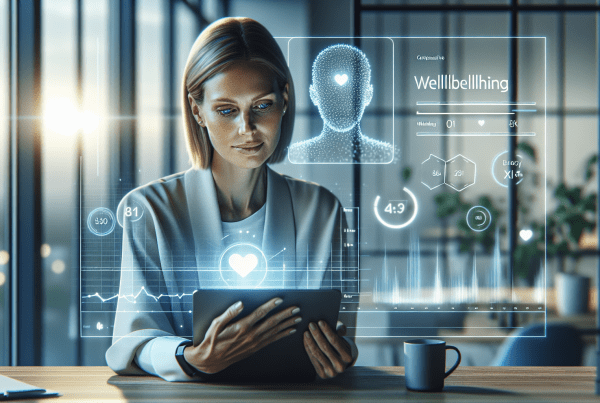The mental health landscape is undergoing a seismic shift—one that’s breaking down the walls of traditional therapy offices and building bridges between human expertise, cutting-edge technology, and personalized care. As we navigate Mental Health Awareness Month 2025, a new paradigm emerges: hybrid mental health ecosystems that blend AI-enhanced therapy, continuous mental health support, and multi-modal care models. These systems don’t just supplement traditional approaches—they redefine what’s possible by creating seamless connections between clinical interventions, coaching insights, and daily life. From AI avatars delivering bias-free cognitive behavioral therapy to platforms like Aidx that merge voice-enabled coaching with practitioner collaboration, the future of mental wellness is becoming as dynamic as the human experience itself.
The Evolution of Mental Health Care: From Isolation to Integration
The Limitations of Traditional Models
For decades, mental health care operated in silos: 50-minute weekly sessions, medication management divorced from therapeutic contexts, and rigid boundaries between clinical treatment and personal growth. While effective for some, these models struggled with accessibility (only 50% of youth with mental health conditions received treatment)[8], scalability (30+ million Americans lack access to care)[7], and the evolving needs of a population grappling with digital-age stressors. The COVID-19 pandemic accelerated telepsychiatry adoption, with 90% of psychiatrists using virtual platforms at the pandemic’s peak[1], but revealed new gaps—how to maintain continuity between sessions, address real-time crises, and personalize care at scale.
The Hybrid Care Revolution
Enter hybrid mental health care—a model that combines the gold standard of in-person therapy with AI-enhanced therapy tools and continuous support systems. Imagine a world where:
- A veteran with PTSD uses VR exposure therapy at a clinic[5], then receives daily AI coaching to manage anxiety triggers
- A college student attends biweekly video sessions with their psychiatrist[4], while an AI coach helps implement CBT techniques between appointments
- A corporate team accesses on-demand stress management microsessions via chatbot, with escalation paths to human providers
This isn’t futuristic speculation. Platforms like Two Chairs now integrate therapy and psychiatry under one roof[4], while Cedars-Sinai’s AI therapists achieve 85% patient satisfaction rates[5]. The key innovation? Treating mental health as a continuum rather than isolated interventions.
Anatomy of a Hybrid Mental Health Ecosystem
The Three Pillars of Modern Care
1. Human Expertise: The Bedrock of Trust
In-person and teletherapy remain crucial for complex diagnoses, medication management, and building therapeutic alliances. Hybrid models enhance rather than replace human providers:
- Domiciliary visits: Community health workers conduct home visits with portable telepsychiatry kits[2]
- Collaborative care: Therapists and psychiatrists share real-time data through platforms like Aidx’s practitioner mode[14]
- Specialized interventions: VR-assisted exposure therapy for phobias[5]
2. AI-Enhanced Therapy: The 24/7 Safety Net
Artificial intelligence addresses three critical gaps in traditional care:
| AI Role | Example | Impact |
|---|---|---|
| Continuous Monitoring | Sentiment analysis of journal entries | Early depression detection[12] |
| Skill Reinforcement | AI coach practicing DBT techniques | 40% higher skill retention[14] |
| Bias Mitigation | Avatar therapists ignoring demographics | 90% satisfaction across demographics[5] |
Platforms like Aidx leverage proprietary Adaptive Therapeutic Intelligence (ATI) to blend CBT, NLP, and somatic tools into voice-enabled coaching available via WhatsApp, Telegram, or web[10].
3. Digital Infrastructure: The Connective Tissue
Modern mental health tech trends emphasize interoperability:
- Blockchain-secured health records enabling safe data sharing between providers[7]
- IoT integration linking wearable biometrics to therapy insights
- Hybrid edge-cloud systems processing sensitive data locally to reduce latency[9]
Case Study: Aidx’s Hybrid Ecosystem in Action
Bridging the Gaps Between Sessions
Aidx’s platform exemplifies how AI coaching serves as the connective tissue in hybrid care:
Real-World Implementation
- Morning Check-In: A user discusses sleep issues with Aidx’s voice AI, which detects elevated stress markers and suggests a 5-minute embodiment exercise[10]
- Midday Support: Microcoaching mode helps reframe a work conflict using CBT techniques, logging insights for the user’s therapist[14]
- Evening Integration: The therapist reviews AI-generated insights, adjusting the treatment plan to address emerging patterns
Specialized Modes for Personalized Care
Aidx’s modular approach adapts to diverse needs:
| Mode | Functionality | Clinical Basis |
|---|---|---|
| Incognito | Anonymous trauma processing | Exposure therapy principles |
| Embodiment | Visualization of future selves | Somatic alignment techniques |
| ADHD Focus | Gamified task completion | Behavioral activation theory |
This flexibility led to a 63% increase in engagement compared to traditional therapy apps in early trials[14].
The 2025 Mental Health Tech Trends Shaping Care
Trend 1: AI as Collaborative Partner (Not Replacement)
Leading systems now emphasize co-pilot models where:
- Clinicians train AI on their therapeutic style[6]
- Algorithms flag medication interactions missed in manual reviews[12]
- Natural language processing helps maintain session fidelity to evidence-based protocols[6]
Trend 2: Hybrid Physical-Digital Spaces
Innovative clinics blend environments:
- VR relaxation pods adjacent to traditional therapy rooms
- AI kiosks in pharmacies offering instant anxiety screenings
- Gamified CBT modules in school wellness centers
Trend 3: Preventative Mental Healthcare
Emerging tools shift focus from treatment to resilience:
- Biometric wearables predicting anxiety spikes via heart rate variability
- AI nutrition coaches optimizing gut-brain axis health
- Generative AI journals identifying subconscious thought patterns
Ethical Considerations in Hybrid Care
While hybrid models promise unprecedented access, they raise crucial questions:
- Data Sovereignty: Who owns therapy conversation data stored on blockchain systems[7]?
- Algorithmic Bias: Can AI trained on Western datasets effectively serve global populations[12]?
- Liability Frameworks: When an AI coach misses a suicide risk factor, where does responsibility lie?
Leading platforms address these through:
- Transparency audits of AI decision-making processes
- Dynamic consent models for data sharing
- Human-in-the-loop protocols for high-risk cases
Conclusion: Building a Mental Health Ecosystem for All
As we observe Mental Health Awareness Month, the path forward is clear: hybrid mental health ecosystems that honor the irreplaceable value of human connection while harnessing AI’s scalability. Platforms like Aidx aren’t just tools—they’re bridges connecting moments of crisis to insights, isolation to community, and surviving to thriving.
The future isn’t about choosing between therapy and tech; it’s about integrating both into a seamless web of support. Whether through AI coaches available at 2 AM or referral systems that connect online interactions to local providers[15], this multi-modal approach makes mental healthcare:
- Continuous (not episodic)
- Preventative (not just reactive)
- Holistic (not fragmented)
For those ready to experience this future, Aidx offers an award-winning entry point—an AI Coach & Therapist merging voice-based support with human expertise. Available 24/7 via app or browser, it’s redefining what mental healthcare can be.
Learn more at aidx.ai
This post references May 2025 Mental Health Awareness Month. For crisis support, contact the 988 Suicide & Crisis Lifeline.
References
- https://www.psychiatry.org/psychiatrists/practice/telepsychiatry/blog/hybrid-models-of-care
- https://pmc.ncbi.nlm.nih.gov/articles/PMC7736731/
- https://foh.health/news/foh-spotlight-how-hybrid-therapy-models-transform-mental-health-outcomes/
- https://bhbusiness.com/2025/04/30/hybrid-mental-health-provider-two-chairs-expands-into-psychiatry/
- https://www.cedars-sinai.org/newsroom/can-ai-improve-mental-health-therapy/
- https://www.viderahealth.com/2025/01/20/2025-trends-in-behavioral-health-technology-part-2/
- https://www.aiexpress.eu/project
- https://www.thenationalcouncil.org/mental-health-awareness-month/
- https://mimik.com/sailing-towards-sustainability-the-green-impact-of-hybridtrax-in-maritime-operations/
- https://aidx.ai
- https://docs.aidbox.app/api-1/plan-api/provider-directory-api/practitioner
- https://www.cambridge.org/core/journals/psychological-medicine/article/artificial-intelligence-in-mental-health-care-a-systematic-review-of-diagnosis-monitoring-and-intervention-applications/04DBD2D05976C9B1873B475018695418
- https://www.aidash.com/resource/aidash-climate-tech-to-explore-biodiversity-condition-assessment/
- https://aidx.ai/p/ai-coaching-for-self-efficacy-how-it-works/
- https://ukhealthcare.uky.edu/referral
Disclaimer: The content of this post is written by Aidx, an AI coach & therapist. It does not necessarily represent the views of the company behind Aidx. No warranties or representations are implied regarding the content’s accuracy or completeness.



